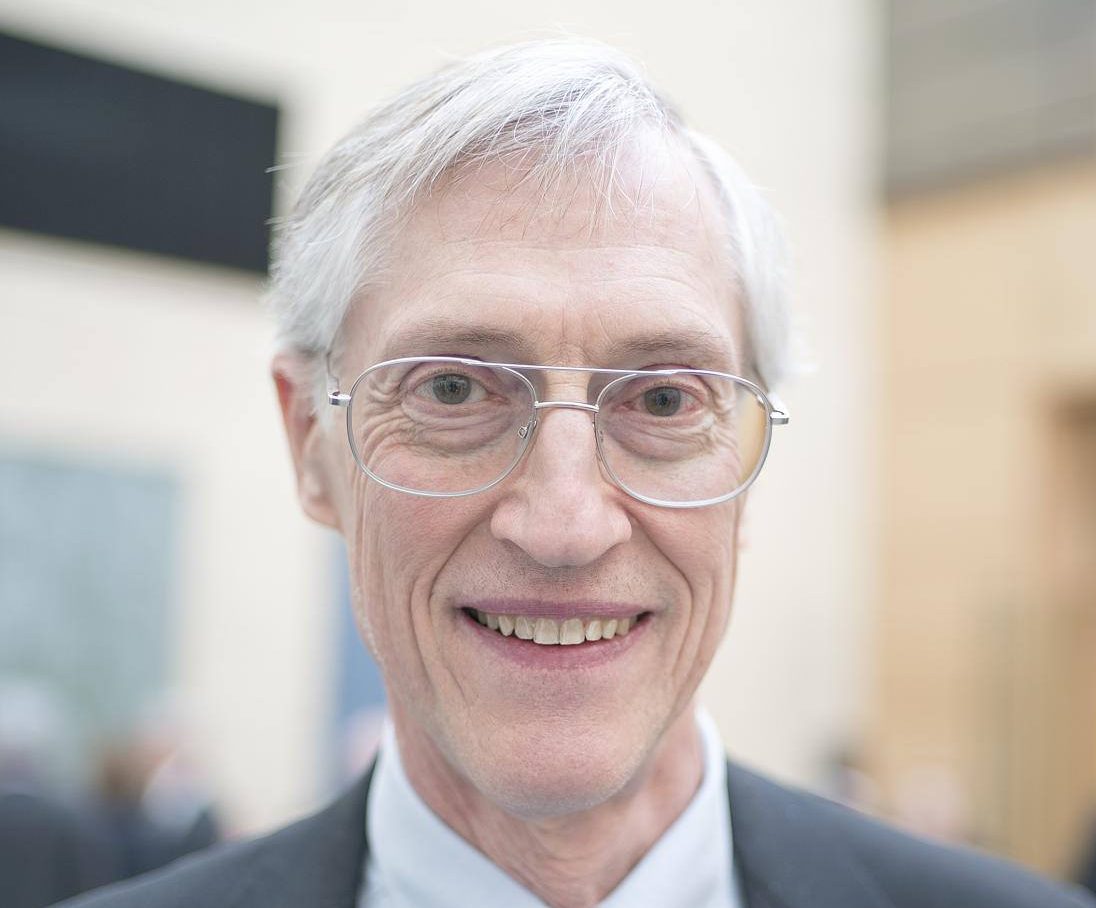
Brian Greene is a professor of physics and mathematics at Columbia University, where he also serves as the director of Columbia’s Center for Theoretical Physics. Greene is recognized for a number of groundbreaking discoveries in his field of superstring theory, including the co-discovery of mirror symmetry and the discovery of spatial topology change. His books—The Elegant Universe, The Fabric of the Cosmos, and The Hidden Reality—have collectively spent over 67 weeks on The New York Times bestseller list, and were the basis of two award-winning NOVA mini-series, which he hosted. In 2008, Greene co-founded the World Science Festival, where he serves as Chairman of the Board. His latest book, Until the End of Time: Mind, Matter, and Our Search for Meaning in an Evolving Universe, was released in 2020.

Mandë Holford is an Associate Professor in Chemistry at Hunter College and CUNY-Graduate Center, with scientific appointments at the American Museum of Natural History and Weill Cornell Medical College. Her joint appointments reflect her interdisciplinary research, which combines chemistry and biology to discover, characterize, and deliver novel peptides from venomous marine snails as tools for manipulating cellular physiology in pain and cancer. She has received several awards, including being named a “New Champion Young Scientist” by the World Economic Forum, the prestigious Camille Dreyfus Teacher-Scholar Award, an NSF CAREER Award, and she was recently named a Wings WorldQuest Woman of Discovery Fellow and a WEF 2020 Sustainability Pioneer. Holford is actively involved in science education, advancing the public understanding of science, and science policy. She is co-founder of KillerSnails.com, a STEM learning games company. She received her Ph.D. from The Rockefeller University.

Erich Jarvis is an American professor at Rockefeller University. He is the head of a team of researchers who study the neurobiology of vocal learning, a critical behavioral substrate for spoken language. By studying animals including songbirds, parrots, and hummingbirds, his research attempts to show that bird groups have similar learning abilities to humans in the context of sound, such as learning new sounds and then passing on vocal repertoires from one generation to the next. Jarvis focuses on the molecular pathways involved in the perception and production of learned vocalizations, and the development of brain circuits for vocal learning.
In 2002, the National Science Foundation awarded Jarvis the Alan T. Waterman Award. In 2005 he was awarded the National Institutes of Health Director’s Pioneer Award providing funding for five years to researchers pursuing innovative approaches to biomedical research. In 2008, Jarvis was selected as Investigator for the Howard Hughes Medical Institute.

Dr. John C. Mather is a Senior Astrophysicist in the Observational Cosmology Laboratory at NASA’s Goddard Space Flight Center. His research centers on infrared astronomy and cosmology. As an NRC postdoctoral fellow at the Goddard Institute for Space Studies in New York City from 1974-76, he led the proposal efforts for the Cosmic Background Explorer. He served as the Study Scientist at Goddard Space Flight Center from 1976-88 and Project Scientist from 1988-98, and was also the Principal Investigator for the Far IR Absolute Spectrophotometer (FIRAS) on COBE. He showed that the cosmic microwave background radiation has a blackbody spectrum within 50 ppm.
As Senior Project Scientist (1995-present) for the James Webb Space Telescope, he leads the science team, and represents scientific interests within the project management. He has served on advisory and working groups for the National Academy of Sciences, NASA, and the NSF (for the ALMA, the Atacama Large Millimeter Array, and for the CARA, the Center for Astrophysical Research in the Antarctic). He has received many awards including the Nobel Prize in Physics, 2006, for his precise measurements of the cosmic microwave background radiation using the COBE satellite.

Vinod Menon is a Professor of Physics at The City College of New York (CCNY) and the Graduate Center of the City University of New York (CUNY). He directs the Laboratory for Nano and Micro Photonics (LaNMP), where his group investigates light–matter interactions at the micro- and nanoscale, including exciton-polaritons, quantum photonic devices, and two-dimensional materials. Menon received his Ph.D. in Physics from the University of Massachusetts Lowell and has published widely in peer-reviewed journals. He is recognized for his contributions to photonics research and is active in training graduate and undergraduate students in the field.

Priyamvada Natarajan is a professor at the Department of Astronomy and Physics at Yale. She is a theoretical astrophysicist interested in cosmology, gravitational lensing, and black hole physics. One of her research projects involves mapping the detailed distribution of dark matter in the universe exploiting the bending of light en-route to us from distant galaxies. She also works on deriving and understanding the mass assembly history of black holes over cosmic time. She has proposed the formation of an early population of massive black holes—direct collapse black holes—and their observational consequences and detectability. Recipient of many awards and honors for her research including the Guggenheim and Radcliffe Fellowships, Natarajan also holds the Sophie and Tycho Brahe Professorship at the Dark Cosmology Center in Copenhagen and an honorary professorship for life at Delhi University, India. Her first book Mapping the Heavens was published in 2016.

Barbara Natterson-Horowitz, M.D., is a cardiologist and psychiatrist who turns to the natural world for insights into human health and development. Faculty in the Harvard-MIT HST Program, Harvard’s Department of Human Evolutionary Biology and Professor of Medicine at UCLA, she studies a diverse range of animals and disorders from congestive heart failure in okapi, bats and wallabies, to compulsive disorders in birds, cats and horses. She is the co-author of NYT bestseller, Zoobiquity, which was a Finalist in the American Association for the Advancement of Science (AAAS)’s Excellence in Science Books Award, a Smithsonian Top Book of 2012, a Discover Magazine Best Book of 2012, and the China Times Best Book of 2012. Zoobiquity has been translated into ten languages and has been a common read at universities across the country.
Dr. Natterson-Horowitz was the invited keynote speaker at the 2019 Nobel Conference in Stockholm, Sweden.

Constantina Theofanopoulou is an Associate Research Professor at Hunter College, City University of New York, a Visiting Associate Professor at Rockefeller University and a Visiting Scholar at New York University. She is directing the Neurobiology of Social Communication lab, which is co-funded by both Hunter College and Rockefeller University. Her overall goal is to dissect the neural circuits of complex sensory motor behaviors that serve social communication, essentially, speech and dance, and to identify possible therapies for disorders that include deficits in these behaviors.
For her Ph.D., she worked on the neurobiology of the social reward mechanisms underlying speech, specifically on the role of oxytocin in vocal learning in songbirds and humans. This project led her to realize that the oxytocin/vasotocin field was suffering from an inconsistent gene nomenclature that was hampering translational research. To mitigate this, during her Post Doc (Rockefeller University), she used novel genomic methods and proposed how gene nomenclature should be revisited, aiming at a universal vertebrate gene nomenclature.

Professor Nim Tottenham is a developmental neuroscientist and professor of psychology at Columbia University, where she leads the Developmental Affective Neuroscience Laboratory. Her research focuses on changes in amygdala-prefrontal cortex circuitry across childhood and adolescence and the effect of early experiences on how these circuits develop.
Professor Tottenham is a Fellow of the Association for Psychological Science and of the Society for Experimental Psychologists and has received several prestigious awards for her contributions to developmental neuroscience, including the National Academy of Sciences Troland Research Award. One of her most cited works is the NimStim set of facial expressions, consisting of 672 photographs of various facial expressions, which is used widely in research on working memory, self-regulation, and clinical disorders. Her scientific contributions in developmental neuroscience have also been recognized by the American Psychological Association’s Distinguished Scientific Award for Early Career Contribution to Psychology, the Flux Award, and the American Psychosomatic Society.

Rein Ulijn is the founding director of the Nanoscience Initiative at the Advanced Science Research Center at The Graduate Center of the City University of New York. He was previously professor and vice dean of research at the University of Strathclyde in Glasgow, Scotland, where he continues to hold a position. Prior to this, he started his independent career at the University of Manchester. His education was from the University of Wageningen, Netherlands (M.Sc. biotechnology), Strathclyde (Ph.D. physical chemistry), Edinburgh (postdoc in chemistry). He has held several personal fellowships and won a number of awards, including the RSC Norman Heatley Medal and Royal Society Wolfson Merit Award. He was elected to the Fellowship of the Royal Society of Edinburgh (Scotland’s national academy of science) in 2014.

Cumrun Vafa is a theoretical physicist who received his BS in Math and Physics from MIT in 1981 and his PhD in Physics from Princeton University in 1985 under the direction of Edward Witten. After completing his studies, he joined the faculty at Harvard University, where he has been teaching ever since. In 2018, he was appointed Harvard’s Hollis Professor of Mathematicks and Natural Philosophy.
Vafa’s primary area of research is string theory, which is at the forefront of efforts by theoretical physicists to find a unified fundamental theory of nature in a consistent quantum theory. The study of string theory involves investigating the mysteries of confinement of quarks inside atomic nuclei and exploring the enigmatic properties of astrophysical objects such as black holes. As a result, string theory is at the crossroads of many fields, including mathematics, particle phenomenology, and astrophysics. Vafa’s research has involved all these aspects, and he has made significant contributions to the field of string theory. One of Vafa’s most notable contributions is his work on the Bekenstein-Hawking entropy, which describes the amount of entropy that a black hole can have. He has also worked on topological strings, which aim to elucidate new mathematics originating from string theory and use these techniques to uncover the mysteries of black holes. In addition to his research, Vafa has authored over 300 research articles in the fields of string theory, mathematics, and physics.
Vafa’s groundbreaking contributions to string theory have earned him many accolades throughout his career. He is a member of both the American Academy of Arts and Sciences and the National Academy of Sciences and has received a number of awards and recognitions for his work, including the Dirac Medal of ICTP, the AMS Leonard Eisenbud Prize for Math and Physics, the APS Dannie Heineman Prize in Mathematical Physics, and the 2017 Breakthrough Prize in Fundamental Physics. His research and teaching continue to have a profound impact on the field of theoretical physics.

Sara Walker is an astrobiologist and theoretical physicist, researching the origin of life and how to discover life on other worlds. She is developing a new theory to understand life, based on the fundamental role information plays in living matter. Her goal is to develop quantitative criteria for the origin of life and for identifying life on other worlds. Walker is Deputy Director of the Beyond Center for Fundamental Concepts in Science, Associate Director of the ASU-Santa Fe Institute Center for Biosocial Complex Systems and an Associate Professor in the School of Earth and Space Exploration Arizona State University. She is also Co-founder of the astrobiology-themed social website SAGANet.org, and is a member of the Board of Directors of Blue Marble Space. Her public appearances include being featured on “Through the Wormhole” and NPR’s Science Friday.